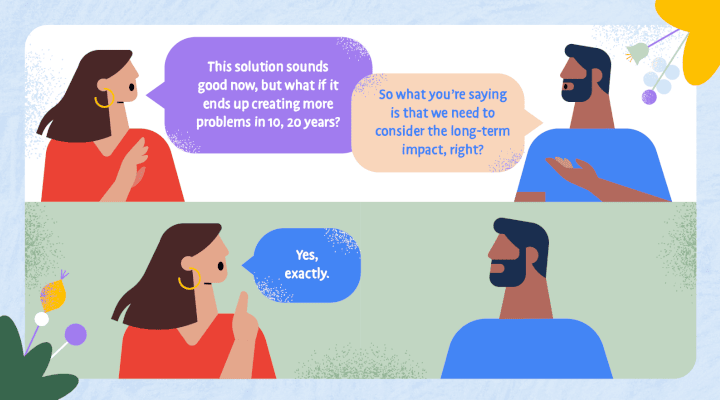Why It’s Okay To Say “I Don’t Agree”

Have you ever disagreed with your colleague, but held back from speaking up?
We don’t always see eye to eye with our team members, especially if they have different personalities and working styles from us.
But we shouldn’t always avoid these conversations. Exchanging differing opinions – in situations such as debates and brainstorming sessions – is good for a team. In fact, preventing healthy disagreements can hinder a team’s growth.
How Voicing Disagreements Improves Teamwork
Difficult conversations can signal that processes or communication needs to be improved. For example, when a team discusses how miscommunication led to a task being carried out wrongly, they may discover flaws in the way work is delegated.
Openly having discussions, no matter how uncomfortable, can help ensure that everyone is on the same page. Seeing disagreements play out without retaliation can also encourage employees to voice other concerns and issues.
Through the exchange of ideas and opinions, the team can learn from one another and build creativity. Colleagues who disagree on the best solution to a problem, for example, will be motivated to find a win-win solution that takes into account each of their perspectives and concerns.
How To Navigate Friction at Work
Disagreements can be uncomfortable to deal with because they often create tension between people. But these conversations, when handled without hostility, can lead to useful outcomes.

Here is how to keep disagreements headed in a productive direction:
- Avoid binary thinking. Binary thinking fuels disagreements. It causes us to believe that an issue only has two sides, but things are not always black and white. Try to see the complexity in the situation and aim for a win-win outcome. Sometimes, both parties have to agree to compromise.
- Practise looping. People are more likely to see things from another perspective when they feel that their views have been heard. Do this by summarising the other person’s statement and repeating it back to them. Ask them to confirm if you understood them correctly.
- Reframe your line of reasoning. To get someone to listen to what you have to say, consider how your point of view can align with their values and concerns. For example, if you are negotiating a later deadline for a task with someone who is concerned with the overall project timeline: explain how spending more time on this task will help save time in a future task, thus keeping the overall timeline intact.

To get more stories like this, subscribe to the Challenge Telegram channel.
- POSTED ON
Sep 9, 2022
- TEXT BY
Hidayah Md Sham
- ILLUSTRATION BY
Liew Xinyi









